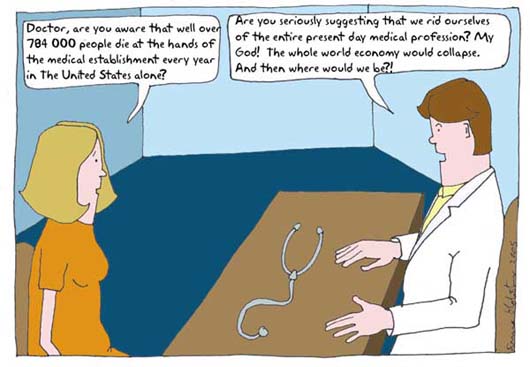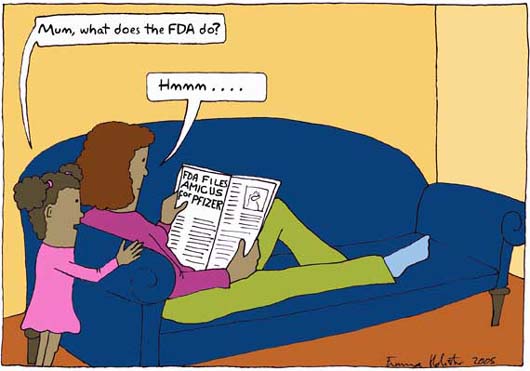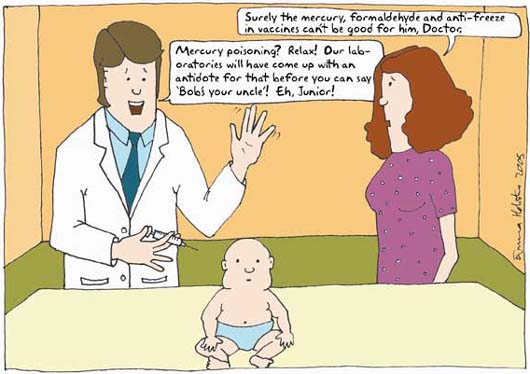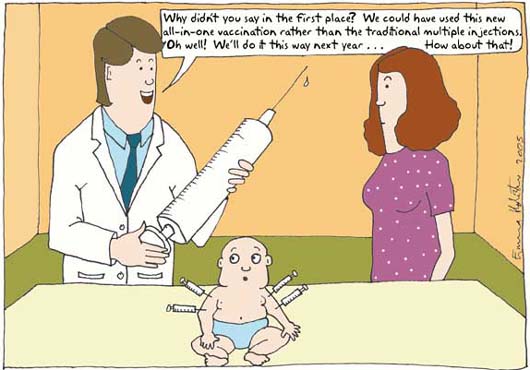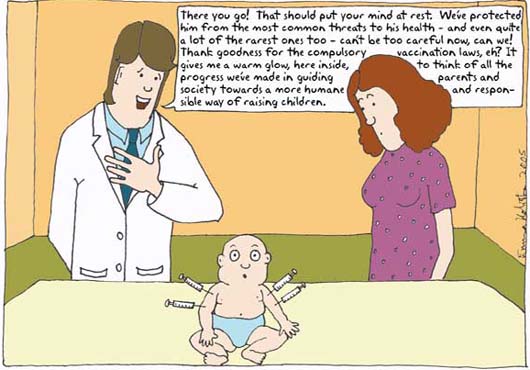The Ghost Lobby - New Labour and the Pharmaceutical Industry
CategoriesBy Martin Walker
"The involvement of pharmaceutical companies with government agencies has allowed the industry to develop a unique system of protection for its products, from suggested production, through licensing, and finally to its 'no fault' compensation scheme, which stops claimants from taking their cases to court. . . .
. . . The last decade has seen the emergence of an increasingly special relationship between the government and the drugs companies. One in which the drug companies are being drawn into funding the modernization of the NHS, in exchange for lucrative deals over 'mandatory' prescribed drugs, especially vaccines. . .
. . . A number of issues were on the agenda for the Association of the British Pharmaceutical Industry (ABPI) when Labour came to power. Members wanted assurances that, in a privatised National Health Service, there would be guaranteed markets for their drugs. They wanted the support of government in dealing with the animal liberation movement, and agreement that member companies could work with government in the multi-million-pound assured market of vaccines production. Finally, they wanted the government to strengthen their monopoly market position in Britain and Europe, and to help choke off competition from nutritional supplements and herbal medicines. . .
. . . When more formal structures of a centralised system break down, and distinctions between manufacturers, regulators and sellers become blurred, when conflict interests are obscured, so is responsibility for any damage caused by drugs. . .
. . .While many patients, consumers and citizens will inevitably be adversely affected by 'Big Pharma's' partnership with government, it is perhaps democracy itself that will be the ultimate loser. Most people now understand that new Labour has slavishly followed North American politicians into Lobbyworld. However, many voters will be even most concerned that non -elected industry representatives, whose companies stand to earn billions in sales to the government, now seem to be setting the agenda on policies for health.
The Commons Health Committee has been taking powerful submissions from, among others, the Royal College of General Practitioners, who have charged the industry with 'disease mongering'. But is the committee actually facing in the right direction and might it not be more appropriate to hold a major independent, judge led, enquiry into the comfortable financial relations between Big Pharma and the British Government."
THE GHOST LOBBY
New Labour and the Pharmaceutical Industry
Martin Walker MA
The House of Commons Health Committee is currently deliberating over its Inquiry into the Influence of the Pharmaceutical Industry, but, with pharmaceutical interests by now the warp in the governmental weft, it is hard to see how the fabric can be unpicked. Some commentators are suggesting that the Inquiry might be better framed as an independent inquiry into the influence of the pharmaceutical industry in Parliament.While much of the revolving door vested interest between the government and the industry is transparent - the MHRA the regulatory body for pharmaceuticals funded by the industry and the Committee on Safety of Medicines stiff with personal and non-personal pharmaceutical interests - much of it is more obscure. Official policy on vaccinations, for instance, is being driven, not as one would hope by impartial medical experts, but by industry involvement, layered deep within the system.
The involvement of pharmaceutical companies with government agencies has allowed the industry to develop a unique system of protection for its products, from suggested production, through licensing, and finally to its 'no fault' compensation scheme, which stops claimants from taking their cases to court.
It is acknowledged that a minority of individuals will suffer adverse reactions, not only to often live viruses, bacteria and parasites in vaccines, but to excipients such as aluminium and mercury-derived thimersal - hence for the very worst affected. But now research, mainly in America, suggests that vaccines might also cause rare, dramatic and immediate side-effects such as encephalomyelitis and death, as well as being factors in the increase of autism, epilepsy, sudden infant death syndrome (SIDS), asthma and diabetes, as well as many less serious conditions such as ear infections.
As the government steps up its vaccination programme supporting an increased number of vaccines it is becoming clear that government cooperation with industry in production, linked to the 'non fault' compensation scheme, is for the pharmaceutical industry a Holy Grail, bringing such profits as were only previously dreamt of by chemical and pharmaceutical companies.
A very special relationship
The last decade has seen the emergence of an increasingly special relationship between the government and the drugs companies. One in which the drug companies are being drawn into funding the modernization of the NHS, in exchange for lucrative deals over 'mandatory' prescribed drugs, especially vaccines.
The British government was the first in the world to launch a mass immunisation programme against the virus meningitis C, in the year 2000. Earlier, the Public Health Services Laboratory (PHSL) had approached a number of companies, including the US drug giant Wyeth, to step up research into a vaccine. When Wyeth came up with a product, the government backed PHSL took over the vaccines testing, conducting many of the larger trials and the post licensing surveillance hand in hand with Wyeth.After discussions with industry, and on the basis of 'a few initial studies', the government decided to inoculate children aged 15-17, as well as babies under one year at a cost of around £14 million. We cannot know what the incidence of meningitis C might have been following the campaign, but a statement later put out by the Medicines Control Agency (MCA) said that there had been 16,527 reported adverse reactions in 7,742 patients, and 12 deaths. The Agency which was and still is funded by the pharmaceutical industry including Wyeth, stressed that none of the deaths had been found to be connected with the vaccine.
In August and September 2000, the Observer's Martin Bright and Tracy McVeigh reported that four of the medical experts advising the government on the safety of the vaccine had links with Wyeth and Chiron, major US vaccine manufacturers. And in 2002, the last time that information on interests was released, among the 23-strong Joint Committee on Vaccination and Immunisation (the body that begins the process of discussing, selecting and recommending vaccines as part of the policy of the Department of Health), many had interests with a wide range of pharmaceutical companies. Professor Keith Cartwright for example stated his interests as being with Wyeth Lederle and Chiron for the Committee on the Safety of Medicines (CSM), while Prof David Goldblatt also declared interests with Wyeth.
The goal of vaccine research in the developed world is to create one super-vaccine that will contain DNA from 20-30 viruses, parasites and bacteria. The vaccine, which would be time-released, would be given to newborn babies. In North America and Britain, right now, researchers are working on the development of 150 viral and bacterial vaccines.
Corporate government
Since the year 2000, rather than distancing themselves from the pharmaceutical companies, and tightening the regulatory screws on conflict of interests, the links between government agencies and pharmaceutical companies has spread unchecked.
A number of issues were on the agenda for the Association of the British Pharmaceutical Industry (ABPI) when Labour came to power. Members wanted assurances that, in a privatised NHS, there would be guaranteed markets for their drugs. They wanted the support of government in dealing with the animal liberation movement, and agreement that member companies could work with government in the multi-million-pound assured market of vaccines production. Finally, they wanted the government to strengthen their monopoly market position in Britain and Europe, and to help choke off competition from nutritional supplements and herbal medicines.
In 2000, New Labour set up the Pharmaceutical Industry Competitive Task Force (PICTF), under the co-chairmanship of then parliamentary under-secretary of state for health, Lord Hunt of Kings Heath, and Tom McKillop, CEO of Astra Zeneca. (Lord Hunt has since resigned as junior health minister in protest at the Iraq war.) The government team included Lord Sainsbury and Stephen Timms MP, then permanent secretary at the department of health. For the pharmaceutical companies, the most senior executives from the ABPI, Glaxo Wellcome, Novartis, Pfizer and Merck Sharp and Dohme attended.
While the PICTF was sitting, with the help of the Department of Trade and Industry (dti), Wyeth -the only pharmaceutical company so far to partner the government in the manufacture of vaccines with its meningitis C jab - set up a lobby group, Networking for Industry (NFI). In turn, NFI, which takes declared annual funding of around £100,000 from the pharmaceutical industry, set up the Associate Parliamentary Group for Health (APGH).
The competitive task force deliberated until March 2001, then a second group was set up to continue the high-level discussions. Named the Ministerial Industry Strategy Group (MISG), it, too, was chaired by Lord Hunt and Tom McKillop. The group also included Lord Sainsbury and Margaret Hodge, Sir Richard Sykes, and ABPI director general Trevor Jones. Leading pharmaceutical executives were again involved, along with ministers and officers from the Department of Health (DH) and dti. The aim was to resolve 'key issues that affect not only the industry, but the interests of government and patients'. That these interests might at times be irreconcilable seems not to have occurred to anyone.
A shadowy concern
Networking for Industry is a subsidiary of Partnership Sourcing Ltd (PSL), which was set up in 1990 by Margaret Thatcher's government, to bring together the dti and the Confederation of British Industry (CBI), Britain's main lobby group for private industry. In the climate of privatisation, PSL was meant to play the matchmaker between buying government departments and sellers in industry. Today, this large 'not for profit' organisation has an influential board that includes representation from the dti and around 35 members, representing government departments, large corporations and University academic departments. PSL is now at the centre of commercial matchmaking between New Labour and private industry. Its board consists of industrialists, members from the dti and CBI, and an MP, Barry Sheerman, Labour member for Huddersfield, chairman of the Commons Education Select Committee, and founding member of NFI. He is now on the NFI board, along with at least two executives and one ex-executive of Wyeth, Kevin James, Bernard Dunkley and Don Barrett
NFI, though describing itself, like PSL, as a 'not for profit' company, is actually a lobby organisation dominated by Wyeth. The company administers four other lobby and 'communications' organisations, which it has set up inside Parliament: the All-Party Group for Design and Innovation (APGDI), the Associate Parliamentary Manufacturing Industry Group (APMIG), and, in two of the most lucrative areas of politics and policy, the Associate Party Sustainable Waste Group (APSWG), and the Associate Parliamentary Group on Health (APGH).
The APGH, whose members put themselves forward to be selected by their parties in the Commons or Lords, consists of Baroness Cumberlege, Baroness Masham of Ilton, and MPs Davis Amess - presently a member of the Health Committees Inquiry into the influence of pharmaceutical companies, David Drew, Sandra Gidley, Patrick Hall, Dr Howard Stoate and Dr Richard Taylor. Networking for Industry provides the group with administrative assistance (office space, computer, telephone and secretarial services). 'Associate members' Abbott, Amgen UK, AstraZenica, BT, BUPA, Close Asset Finance Limited, GlaxoSmithKline, Kimberly-Clark Professional, Lloyds Pharmacy, Napp, Northgate Information Solutions, Orange, Pfizer, Sanofi-Synthelabo, Sankyo, WCI, Wyeth, Xograph, each provide £5,000 per annum, with an additional £15,000 from Wyeth (registered December 2003).
The setting up and funding of groups within parliament by commercial lobby companies has become relatively commonplace since Labour came to power. And perhaps few eyebrows would be raised at the disclosure that the ABPI is controlling a parliamentary group on health. However, in the shadow of this group, Wyeth and the ABPI have placed another group of advisors, who are not members of parliament, but who, through the APGH, have direct access to government offices.
Advising New Labour on the Politics of Health
APGH advisors include Sir Kenneth Calman, chief medical officer to the government from 1991 to 1998, now chancellor of Durham University and appointed by Lord Sainsbury as a member of the new Chemistry Leadership Council; Duncan Eaton, chief executive of the NHS Purchasing and Supply Agency, who has spent his career in the NHS and held senior positions in a number of health authorities; David Colin-Thorne, the national clinical director for primary care at the DH - and Bernard Dunkley and Kevin James, executive directors of Wyeth.
Dunkley is also a director of Networking for Industry and is the coordinator of the Advisors group and special advisor to the APGH. With 37 years' experience in drugs marketing, he is currently the serving government affairs director for Lederle and Wyeth Laboratories, the UK vaccine manufacturers.
Kevin James is executive managing director for Wyeth UK. More importantly, he is a member of the ABPI board of management. In 2004, James took over chairmanship of the American Pharmaceutical (companies in England) Group (APG), which makes him one of the highest-ranking drugs salesmen in Britain.
Don Barrett who is on the board of NFI but not on the Advisors group is a past Corporate Affairs Executive for Wyeth in Britain. In this role, he worked with the NHS and voluntary organisation Women's groups, ensuring the marketing of HRT. In the year 2000, one year after his retirement from Wyeth, Barrett was invited onto the organising committee of the charity Women's Health Concerns, following 'his long involvement with the charity'.
It is easy to see the kind of policies that Wyeth and the ABPI might want to influence, through NFI and through the APGH. Assured markets for vaccines, continued buying of HRT, a clampdown on natural health remedies all spring to mind. Through the APGH, on behalf of Wyeth or the ABPI, they talk regularly and 'covertly' to the offices of the PM's Policy Unit, or the offices of the Deputy Leader.
Since 2002, the APGH has provided an extensive diary, advice on health issues and agenda for MPs who are members of its password-secure website. The secretariat, the advice group and the website have, in fact, done everything a good civil servant would do to support MPs on health matters. It has an agenda of breakfasts and meal-time meetings, seminars and talks, in buildings adjacent to the Commons, where it introduces ministers, NHS and DH staff to drug company executives and private health service providers.
There can be no doubt that some of the members of the APGH have no idea that they are part of a manoeuvre by a lobby group. Sandra Gidley, for example, representing the Lib Dems, clearly states as part of her personal website manifesto that, as 'Your Member of Parliament, I will never take cash from lobbying companies.' Dr Richard Taylor, MP for Wyre Forest, is the only independent member of the House for the Health Concern Party.
Dr Howard Stoate, however, is now chair of the All Party Group on Men's Health (APGMH), of which David Amess and Sandra Gidley are also members. Stoate set up the APGMH on behalf of the Men's Health Forum (MHF). Despite being a registered charity, the MFH is - like so many health charities and patient advice and support groups - an instrument of pharmaceutical marketing, supported by, among others, Merck Sharp & Dohme, and Roche.
Making The Right Connections
Undoubtedly, the two heavyweights of the APGH and its group of advisors are Baroness Cumberlege, who is both a member and an advisor, and Lord Hunt of Kings Heath, an advisor. Despite coming from different sides of the House, these two peers have a lot in common. They were both minister of health, Cumberlege during the premiership of John Major from 1992 to 1997, and Hunt from 1999 to 2003. They are both NHS modernisers, and they both have had dealings with pharmaceutical companies. But, perhaps most perversely, Lord Hunt is a director of Baroness Cumberlege's NHS-integrated health consultancy company, Cumberlege Connections.
When Baroness Cumberlege was elevated to the Lords, she began the long haul through PR and health consultancy companies, which ended in 1993 with Cumberlege Connections, a consultancy that organises conferences and training courses to equip people to deal with government and the NHS.
On her way to Cumberlege Connections, the Baroness passed through some more and less prestigious companies. From 1997 until 2001, she was an executive director of MJM Healthcare Solutions, which, with its sister organisation, Mental Health Strategies, is part of Niche Healthcare Consulting. In 2001, she joined the board of Huntsworth plc. The company, 'a specialised communications group with public relations at its core', is comprised of a number of market service consultants, whose main clients are Astra Zeneca, Pfizer, Chiron Evans vaccines, Merck, Shire, Aventis, Novartis, Roche and Abbott Laboratories.
In 2001, Cumberlege apparently left Huntsworth, to team up with Anthony Mckeever, a senior NHS executive who moved to the private sector, as co-director of Quo Health. In January 2003, Quo Health was listed by New Labour as one of eight private companies added to the Franchising Register of Expertise, enabling it to submit management bids for failing NHS hospitals.
Lord Hunt, while Minister of Health, as well as instigating the Pharmaceutical Industry Competitive Task Force Report, and co-chairing the Ministerial Industry Strategy Group, was the instigator of a member of the G10 committee that worked on European drugs industry competitiveness. He is actually only a year out of the tight policy group that has steered Labour through the modernised NHS and its compact with the pharmaceutical cartels. Only a year away from his statement, 'The UK has a thriving and successful pharmaceutical industry and we want to keep it that way.' In January 2004, he took up a $58,000-a-year appointment to chair the new Patient Safety Agency, a post for which his meetings with pharmaceutical company executives eminently suits him.
Wyeth: Partnering Democracy
One result of the Ministerial Industry Strategy Group, announced in March 2002 by Lord Hunt, was an agreement between the DH and the pharmaceutical industries, under which the government was to help pharmaceutical companies to fund and carry out clinical research on drugs, particularly vaccines, manufactured in the UK. This agreement, it was said, would lead to the faster development of new drugs.
The agreement was something that Wyeth, in particular, had pushed for since it collaborated with the PHSL over the meningitis C vaccine. It resolved a number of issues at the centre of the 2001 report by Liam Donaldson, the present CMO. Titled Getting Beyond the Curve, the report became new Labour's founding document on the reorganisation of the NHS approach to infectious diseases. It recommends the development and licensing of more multiple vaccines for children, in partnership between government and the pharmaceutical industry.
The report also suggested the reorganisation of the PHSL, and the launching of a new-style Health Protection Agency, under whose auspices the genetically-modified vaccines would be developed. Called the Health Protection Agency, this American-style disease intelligence agency, is going into the manufacture of vaccines in partnership with leading pharmaceutical companies. The agency which also oversees the production of anthrax vaccine and is locked into Britain's military defence establishment and its counter terrorist strategies, is based at Porton Down - Britain's germ warfare establishment.
The new Health Protection Agency, which brings together pharmaceutical companies and 'government' scientists in NHS labs, and which will involved NHS clinicians' post-licensing surveillance of new vaccines, does not even have a policy of public disclosure of interests.
When Hazel Blears, minister for public health, announced the board membership of the new HPA, in an apparent attempt at subterfuge, she declaimed loudly about the political interests of new members but failed to announce their financial or pharmaceutical interests. At the agency's first meeting of the 17-person board in 2003, the minutes record that the chairman, Sir William Stewart, asked if anyone had any interests to declare that had any bearings on the subject of the meeting. Everyone said no, and the meeting moved on. And yet, at least five board members have had, or now have, either research or personal links with pharmaceutical companies which the HPA could well be in partnership with.
Among these four is Sir William Stewart himself, who, in September 1998, became non-executive chairman of Cyclacel, the cancer therapeutics company, and who was until two years ago a member of the Corporate Technology Board of what used to be SmithKline Beecham.
When more formal structures of a centralised system break down, and distinctions between manufacturers, regulators and sellers become blurred, when conflict interests are obscured, so is responsibility for any damage caused by drugs.
The ABPI's policy on vaccines is that, with many more being developed, especially for use in children - in North America, some public school children now have around 15 mandated shots - it will be more cost-effective, and politically less contentious, to give multiple vaccines. It has pushed very hard for these vaccines to be developed and manufactured jointly with government, which would clearly afford drug companies, not only an assured market, but the security of government commitment to them and official endorsement of their importance, efficacy and safety.
The problems with involving government departments such as the Health Protection Agency with the pharmaceutical companies in the development of vaccines, has already been made manifest. Post-licensing surveillance of the meningitis C vaccine after the PHLS-Wyeth collaboration, was not the measured process it might have been, and parents' complaints about adverse reactions appeared to be treated with scepticism and their figures not released to those who telephoned the MCA.
An Iatrogenic History
Wyeth Pharmaceuticals is no stranger to mistakes damaging to the public - and its own financial - health. With its partner company, Lederle, it has been involved in vaccine manufacture since it first became a commercial certainty. From the Fifties, Wyeth produced whole-cell pertussis (whooping cough) vaccine. From the beginning, it was found to cause high numbers of adverse reactions, often resulting in central nervous system damage. The linkage was so strong that Sweden banned whole-cell pertussis vaccine in the Seventies.
Despite an acellular vaccine being adopted in Japan, Sweden and other countries, the US government continued to partner Wyeth with its version. In both Britain and the USA, regulatory bodies concurred that there was no evidence of serious damage.
In 1979, in Tennessee, four infants died of Sudden Infant Death Syndrome, apparently within 24 hours of the administration of Wyeth's DPT (diphtheria, pertussis, tetanus) vaccine. There were 96,105 doses given out from this batch before it was withdrawn. Wyeth then adopted a policy of sending only small batches to widely dispersed geographical areas, so if a batch caused serious adverse reactions, their statistical impact would be reduced.
Cases brought against the manufacturers of DPT in the early Eighties, led in 1986 to the National Vaccine Injuries Act and the National Vaccine Compensation Act, which resulted in Northern America in the so-called 'no fault' awards. Like our own Vaccine Damage Payment Act, which came into force in 1979, its purpose was to prevent individuals or groups from taking civil liability actions.
Following lawsuits in the late Nineties, Wyeth's slimming drugs Pondimin and Redux were found to be responsible for causing, among other conditions, valvular heart disease. Claims on the company, most of which are still being dealt with, numbered initially 111,7000. Of these, 11,200 have been processed to completion. Wyeth's 2003 Annual Report suggests that claims will continue to be brought until the year 2015. The sum set aside in trust for compensation is currently $3,750 million, although the company fully expects claims to exceed this amount.
Wyeth's Rotashield vaccine was developed against the rotavirus, under intense competition with Merck. A monkey-based, live, oral vaccine, it was approved by the US Food and Drug Administration (FDA) in August 1998, and administered on a mandatory basis. Just a year after it was licensed, in July 1999, it was withdrawn from the market after mounting reports of severe bowel obstruction in almost 60 vaccinated children, 29 of whom required surgery, and one of whom - a five-month-old infant - died. A study showed that onset of the illness was increased by 60 per cent among children receiving the vaccine. Cases of bowel obstruction were observed during Rotashield trials, some of which were funded by Wyeth, but investigators had deemed them statistically insignificant.
In 2003, Wyeth got its fingers slightly burnt, when it tried to persuade a wary public to take the FluMist nasally administered vaccine to guard against the supposed coming influenza epidemic, which they and the US government presented as a certainty. The vaccine was produced by MedImmune and marketed by Wyeth. It was due to be sold through Wal-Mart, the world's largest retailer, at almost $70 a shot. The budget for persuading people to use it was reckoned at $25 million over a two-and-a-half-month period.
As Dr Sherry Tenpenny pointed out in her article, 'Risks of FluMist Vaccine', which appeared in the online vaccine conference at redflagsdaily.com, the live-virus vaccine actually gave people flu. What is more, the packet instructions warned that recipients should 'avoid close contact with immune-compromised individuals for at least 21 days'. Dr Tenpenny suggested that untold millions of Americans were immune-compromised. When neither the take-up of FluMist nor the hyped epidemic materialised, Wyeth dumped MedImmune and abandoned the crusade to free the world of flu.
Throughout the years 200 to 2004, Wyeth who, at the height of sales controlled 70% of the market in HRT, has come under constant criticism after it advertised HRT as being useful to prevent heart disease, strokes and alzheimers disease. The NHS backed Wyeth in all these claims answering letters from MPs with bland assurances that HRT was of no danger to women who took it.
Wyeth is not a rogue company in an industry ruled by probity and philanthropy. It is, however, the fifth-largest purveyor of prescription drugs to the NHS and is more deeply engaged than any other pharmaceutical company in providing services such as primary care training programmes for nurses and practice managers. The company also sponsor, train and fund nurses in post licensing surveillance of vaccines. In giving, on its website, examples of partnership work with the NHS, it presents itself as though it were a professional health care company, rather than a producer of patent medicines. Its literature and website abound with homilies about the realised need for ethical behaviour and a responsible approach to selling drugs to the NHS, but it is quite clear what NHS entry means to Wyeth.
While many patients, consumers and citizens will inevitably be adversely affected by 'Big Pharma's' partnership with government, it is perhaps democracy itself that will be the ultimate loser. Most people now understand that new Labour has slavishly followed North American politicians into Lobbyworld. However, many voters will be even most concerned that non -elected industry representatives, whose companies stand to earn billions in sales to the government, now seem to be setting the agenda on policies for health.
The Commons Health Committee has been taking powerful submissions from, among others, the Royal College of General Practitioners, who have charged the industry with 'disease mongering'. But is the committee actually facing in the right direction and might it not be more appropriate to hold a major independent, judge led, enquiry into the comfortable financial relations between Big Pharma and the British Government.
mandato da Robin Good il Tuesday December 21 2004
aggiornato il Wednesday November 8 2006URL of this article:
http://www.newmediaexplorer.org/emma_holister/2004/12/21/the_ghost_lobby_new.htm
Related Articles'Dirty Medicine' Now Available - Martin Walker's Classic on the Assault on Complementary Health-Care by Organised Science, Big Business and the Media
This classic of investigative journalism is now available for the first time as an e-book The Truth Campaign 'Quite simply, one of the best and most important books I have ever read. Walker's research, integrity and diligence sets a standard that very few journalists ever achieve.' Ivan Fraser "Dirty Medicine embodies investigative reporting at its best." Townsend Letter for Doctors. "This excellent and well researched book gives, for the first... [continua a leggere]
December 7, 2004 - Robin Good'Skewed' by Martin Walker
Reviewed by Robert Allen - Blue Reviews Skewed is an essential text that needs to be available to everyone who goes to college with the ideal in their head that they want to work in the chemical industry or practice medicine. It also needs to be in every major bookstore, and the author needs to appear on tv, radio and in print telling his story. For too long industry and... [continua a leggere]
October 10, 2004 - Robin Good'Your Money and Your Life' by Martin Walker
As published by the Ecologist. Britain's cancer charities are a multimillion pound industry. But they are no nearer to 'curing' cancer than they were half a century ago. Quite the opposite -much of their time and money is spent avoiding awkward questions about what causes the disease. Martin J Walker investigates. Everybody knows what causes cancer. Bad diet; too much sunlight; cigarettes; faulty genes - and, of course, that virus... [continua a leggere]
October 10, 2004 - Robin GoodInterview with Martin Walker and his Biography
As the European world of alternative medicine braces itself once again in its ever more ardent fight to preserve itself against such legislative attacks as the ban on supplements and natural therapies, more people are hearing of the health freedom movement and with it such pionneers as Martin Walker, author of 'Dirty Medicine' and 'Skewed'. If the mainstream press in the United Kingdom is hell bent on smothering the facts... [continua a leggere]
October 26, 2004 - Robin GoodDr Jacques Benveniste: The Case of the Missing Energy
Following the recent death of the renowned, some say infamous, scientist Jacques Benveniste, I am reminded of the words of Herman Hesse: "The bourgeois today burns as heretics and hangs as criminals those to whom he erects monuments tomorrow" ('Steppenwolf') A few days ago Benveniste's death was lamented by the French newspaper Le Monde, who said of his passing away that the world of "biology has lost one of its... [continua a leggere]
October 18, 2004 - Robin GoodLo�c Le Ribault - The French Authorities Keep Up the Chase
Earlier this year the French authorities were finally successful in pulling off an international arrest warrant which landed Lo�c Le Ribault in prison in Switzerland where he was then extradited to a prison in France. Martin Walker offers a brief introduction to Lo�c's thank you letter to his supporters following his release from prison.... [continua a leggere]
December 4, 2004 - Robin Good
"Art does not reproduce the visible; rather, it makes visible." Paul Klee 1879-1940 |
||

This work is licensed under a Creative Commons License.
Medical Disclaimer: The information on this site is not a substitute for medical advice.

